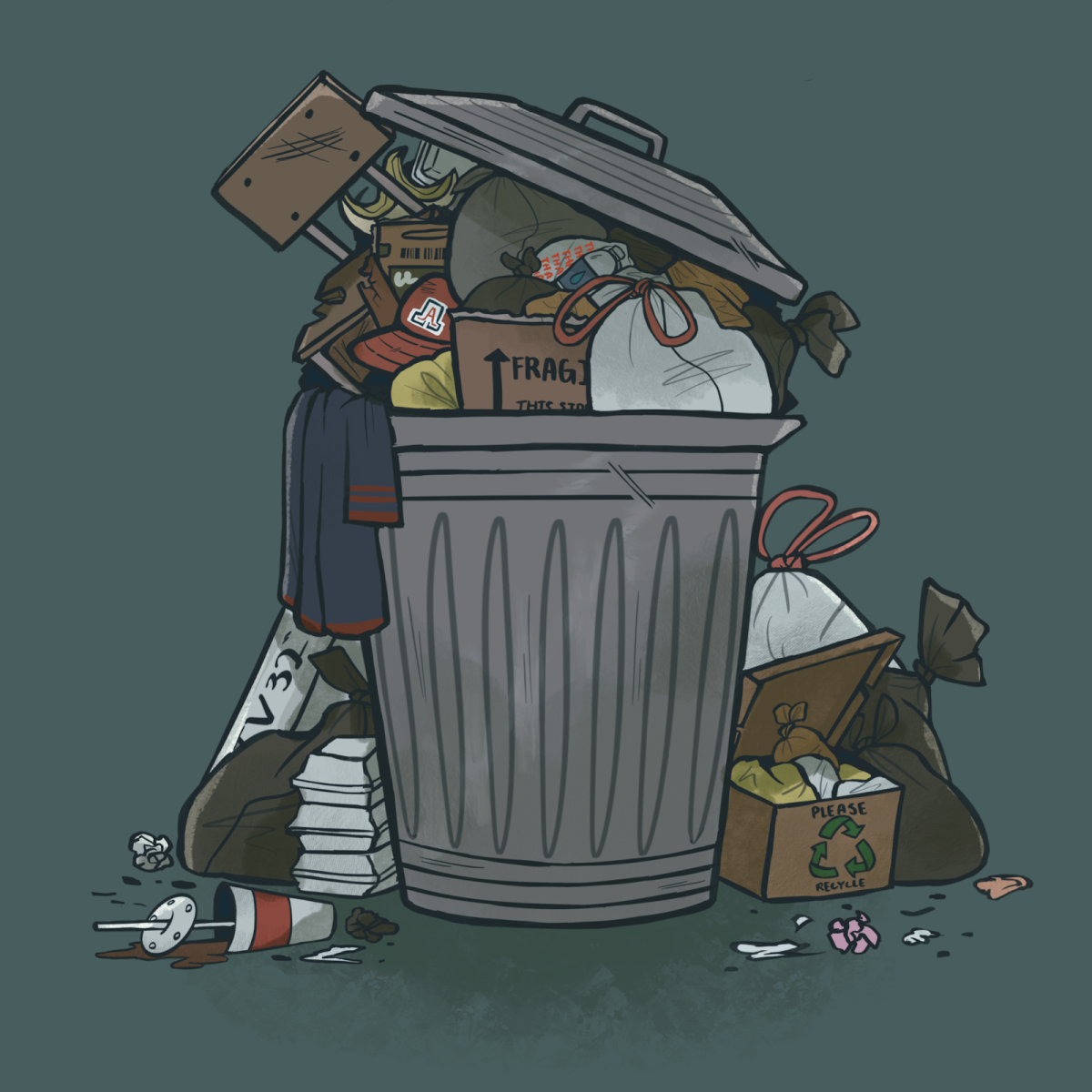When I moved into the college dorms two years ago, TikTok was gaining popularity. I relied on it for information about dorm move-in — what I don’t need to be successful and what I do need to make the most out of my college experience. Video after video emphasized nice and new mini fridges, mattress pads, headboards, wall mounts, shower shoes, going out clothes, makeup holders and the list goes on.
I caved and bought everything possible based on the overwhelming amount of social media videos I watched, not realizing at the end of the year I would have an ever growing give-away pile. What I expected to donate ended up in the University of Arizona’s dumpsters alongside several other students’ year-old items.
— Sophia Hammer
UA move-out dumpsters are far from the rotten cesspools many might expect. Here are a few of the items found inside a single, unassuming Highland Commons dumpster in May: metal and bamboo shelves, foldable chairs, rugs, blankets, pillows, fully-packaged costumes, high-quality sketchbooks and art paper, new books, plastic storage drawers, jeans, T-shirts, baseball caps, sealed crafting kits, unused school notebooks and academic planners and vacuum cleaners. Perhaps the most unfortunate items regularly found in such dumpsters are the smashed mirrors. Not because mirrors are incredibly valuable, but because most of these mirrors were likely perfectly usable — up until someone threw them haphazardly into the dumpster, where they shattered into a million reflective shards.
All in all, a significant fraction of the “trash” found in this dumpster (and others like it) was either brand new, nearly new or like new.
— Fiona Sievert
Nicole Collins is the waste reduction director in the UA’s Students for Sustainability Club. They work to educate and promote environmentally friendly ways to handle waste. In regards to handling waste, Collins said, “There is no way. We see trash everywhere. All over the streets, in the landfill and piling up in trash cans, and it gets in our environments.”
— Sophia Hammer
Many would argue that the answer to the university’s waste problem is something that nearly every environmentalist has been shouting at the top of their lungs for decades: reduce, reuse and recycle! To encourage these kinds of environmentally-friendly habits, the UA has taken measures to improve waste management with initiatives like Dodge the Dumpster. Unfortunately, these programs are often discontinued, which leads to the question: Are we doing enough?
Students continue to treat the contents of their dorm rooms like single-use plastics — heck, even single-use plastics might have a better chance of being recycled or reused than a college student’s pink and gold wall art. The goal here though is not to bash students for their actions, but to recognize that these behaviors are shaped by culture and context.
— Fiona Sievert
Looking back I wish I would have done something different, but I wasn’t incentivized to. I found it difficult to put time into reusing my items when I had one-day prime shipping on Amazon. So, this is my call to students at the UA to take steps to recognize the social systems we are made to behave within — our actions are formed by mass consumerism and perpetuated by social media, resulting in alarming amounts of waste. There is no doubt that consuming brings instant gratification and a simple fix to our problems, but we need to look towards avenues that highlight sustainability even if they are unconventional.
“There’s ways to reuse pretty much anything. It’s just a matter of having the willpower and motivation to do it,” Collins said. “A lot of people don’t like to repurpose things, because they are like ‘oh I’ll just buy another one’ or ‘oh I’ll just throw it away.’”
We know this isn’t the way it should be, but it is hard to break away from the information we are constantly hearing online and from others alongside the throw-away culture we have been taught for so long.
— Sophia Hammer
Without any legitimate paths toward effective sustainability, students will continue to take alternate routes. One potential course of action has been a kind of rescue mission: embrace what some may see as unsavory, and leap into the dorm dumpsters! Posted on the side of each of these dumpsters though is a notice which expressly forbids any “scavenging.”
Yet, suppose one were to ignore such a warning and clamber up that dumpster ladder anyway. If one were to consider doing something like that (not that such behavior should be condoned), it would be important to know that some dumpsters are deeper and more densely packed than others, so quite a bit of caution is necessary. Since dumpsters also may contain sharp or potentially dangerous objects, as well as things that are just plain disgusting, wearing long pants, a long-sleeved shirt and gloves would also be advisable.
— Fiona Sievert
Not all students are remotely interested in the idea of dumpster diving, but with the amount of waste we are seeing we shouldn’t place blame on the students who are. If you are a student who is interested in getting involved in ways that can help reduce our waste across campus, Collins shared important projects the Waste Reduction sector of UA SFS is working on including a “campus thrift store for stuff that would be thrown out from dorms,” a fall clothing swap, upcycling projects through UA Catalyst and more. To find out more about reuse and these programs at the UA you can visit UA SFS’s waste reduction page at sfsdirector.wixsite.com/sfswebsite/waste-reduction.
— Sophia Hammer
As students, we need to demand and expect change; and if those in charge of waste management do not think it necessary to adapt their policies, then who or what is to stop us from enacting the needed change ourselves, from going dumpster diving or ‘guerrilla thrifting’? It is time to question the authorities. Why did anybody ever think it was a good idea to make sustainability against the rules?
— Fiona Sievert
Follow the Daily Wildcat on Instagram and Twitter (X)

Sophia Hammer is University of Arizona junior studying political science and global studies. She loves writing about the local Tucson community. She also loves exploring in nature, enjoying live music and working on the radio.

Fiona Sievert is an undergraduate University of Arizona student studying Anthropology and East Asian Studies with a minor in German Studies. She loves linguistics, wearing wacky outfits, writing pretentious movie reviews and (occasionally) being a dirtbag in the great outdoors!










